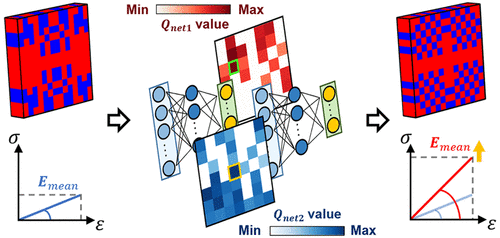当前位置:
X-MOL 学术
›
ACS Mater. Lett.
›
论文详情
Our official English website, www.x-mol.net, welcomes your
feedback! (Note: you will need to create a separate account there.)
Deep Reinforcement Learning for Digital Materials Design
ACS Materials Letters ( IF 9.6 ) Pub Date : 2021-08-27 , DOI: 10.1021/acsmaterialslett.1c00390 Fanping Sui 1 , Ruiqi Guo 1 , Zhizhou Zhang 1 , Grace X. Gu 1 , Liwei Lin 1
ACS Materials Letters ( IF 9.6 ) Pub Date : 2021-08-27 , DOI: 10.1021/acsmaterialslett.1c00390 Fanping Sui 1 , Ruiqi Guo 1 , Zhizhou Zhang 1 , Grace X. Gu 1 , Liwei Lin 1
Affiliation

|
Designing composites has been a research topic of interest in the field of materials science. As an elegant mathematical representation for composites, the concept of digital materials (DMs) was developed to express structures with complex geometries and various material distributions. DMs have a vast design space to achieve targeted physical properties, which makes it challenging for solving inverse problems. Here, a deep reinforcement learning (DRL) scheme is utilized to automate the DM design process without the designer’s prior knowledge. Based on the reward signal of structural mechanical property changes, DRL algorithms can initiate new design patterns in a self-updating process. As a demonstration example, a DM system composed of two different materials are selected as testing environments with three different levels of design space sizes. The collaborative deep Q network (DQN) architecture is developed to comprise two cooperative agents for two types of element-level modification operations to satisfy the design constraints, such as material fraction. The quality of each composite pattern is calculated through the finite element analysis (FEA) simulation. Results show the proposed approach can effectively handle the complex state-action space problems for the digital material design process with significant computation advantages, compared with those of the genetic algorithm with a 15.9% final design quality enhancement. As such, this new class of DRL scheme could be a powerful tool to enable the autonomous discovery process for next-generation free-form DM designs.
中文翻译:

数字材料设计的深度强化学习
设计复合材料一直是材料科学领域的一个研究课题。作为复合材料的优雅数学表示,数字材料 (DM) 的概念被开发用来表达具有复杂几何形状和各种材料分布的结构。DMs 具有巨大的设计空间来实现目标物理特性,这使得解决逆问题具有挑战性。在这里,深度强化学习 (DRL) 方案用于在没有设计人员先验知识的情况下自动化 DM 设计过程。基于结构力学性能变化的奖励信号,DRL 算法可以在自我更新过程中启动新的设计模式。作为演示示例,选择由两种不同材料组成的 DM 系统作为具有三种不同设计空间大小级别的测试环境。协作深度 Q 网络 (DQN) 架构被开发为包含两个协作代理,用于两种类型的元素级修改操作,以满足设计约束,例如材料分数。通过有限元分析 (FEA) 模拟计算每个复合图案的质量。结果表明,与遗传算法相比,所提出的方法可以有效地处理数字材料设计过程中复杂的状态-动作空间问题,具有显着的计算优势,最终设计质量提高了 15.9%。因此,这种新型 DRL 方案可能是一个强大的工具,可以为下一代自由形式的 DM 设计启用自主发现过程。
更新日期:2021-10-04
中文翻译:

数字材料设计的深度强化学习
设计复合材料一直是材料科学领域的一个研究课题。作为复合材料的优雅数学表示,数字材料 (DM) 的概念被开发用来表达具有复杂几何形状和各种材料分布的结构。DMs 具有巨大的设计空间来实现目标物理特性,这使得解决逆问题具有挑战性。在这里,深度强化学习 (DRL) 方案用于在没有设计人员先验知识的情况下自动化 DM 设计过程。基于结构力学性能变化的奖励信号,DRL 算法可以在自我更新过程中启动新的设计模式。作为演示示例,选择由两种不同材料组成的 DM 系统作为具有三种不同设计空间大小级别的测试环境。协作深度 Q 网络 (DQN) 架构被开发为包含两个协作代理,用于两种类型的元素级修改操作,以满足设计约束,例如材料分数。通过有限元分析 (FEA) 模拟计算每个复合图案的质量。结果表明,与遗传算法相比,所提出的方法可以有效地处理数字材料设计过程中复杂的状态-动作空间问题,具有显着的计算优势,最终设计质量提高了 15.9%。因此,这种新型 DRL 方案可能是一个强大的工具,可以为下一代自由形式的 DM 设计启用自主发现过程。











































 京公网安备 11010802027423号
京公网安备 11010802027423号